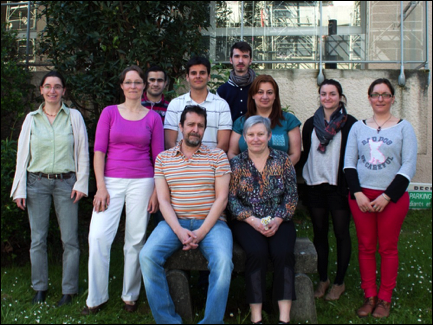Mitochondria, Stress and Cell Death
Institut de Biochimie et Génétique CellulairesUMR 5095, CNRS et Université de Bordeaux
1 rue Camille Saint Saëns
33000 Bordeaux - Bordeaux
Site web - -

Research themes
- Stéphen Manon: Studies of BcL2 family proteins interactions with mitochondria.
This research axis uses simplified models, namely the heterologous expression in yeast, to investigate different aspects of the regulation of the dynamic interaction between Bax and mitochondria during apoptosis, namely its phosphorylation and its interaction with the anti-apoptotic protein Bcl-xL. A sub-axis involving structural studies of Bax, is animated by an assistant-professor (Cécile Gonzalez). - Muriel Priault: Caracterisation of Bcl-xL pro-survival functions.
We study the molecular crosstalks which allow two antagonist programs, apoptosis and autophagy, to communicate and keep cell survival under tight survey. We pay a particular attention to the oncogene Bcl-xL, a canonical Bcl-2 family member. The contribution of this oncogene to cancer progression is mainly attributed to its anti-apoptotic activity, but our recent data show that Bcl-xL also contributes to autophagy regulation trough at least two pathways.
1/ Bcl-xL undergoes a post-translational modification called deamidation. Monodeamidated Bcl-xL displays enhanced pro-autophagic activity but decreased clonogenic properties compared to native Bcl-xL.
2/ Bcl-xL is involved in an interaction with the small GTPase Rab7, which works in endocytosis,. Through this interaction, Bcl-xL interferes with the degradation of nutrient transporters and growth factor receptors, thus helping cells to operate a continuous food intake and transduce unrelenting proliferation signals.
All these data show that Bcl-xL is a multifaceted protein which prove highly resourceful when it comes to sustain cell survival. - Nadine Camougrand: Function and regulation of mitophagy.
The selective elimination of mitochondria is a major process in the cellular adaptation to stress conditions and mitochondria alterations. This process has been first characterized in the lab, in yeast cells grown under strict respiratory conditions. We have shown that, depending on the initial trigger, different signalling pathways are leading to mitophagy and/or to general autophagy. Our project aims at characterizing the molecular events underlying these pathways.
Publications
– Deffieu MI, Bhatia-Kissova I., Salin B., Galinier A. Manon S. & Camougrand N. (2009). Glutathione participates in the regulation of mitophagy in yeast. J. Biol. Chem. 284 (22) : 14828-37.
– Kissova I.B. & Camougrand N. (2009). Glutathione participates in the regulation of mitophagy in yeast. Autophagy 5 (6) : 872-3.
– Bhatia-Kissova I. & Camougrand N. (2010). Mitophagy in yeast : actors and physiological roles. FEMS Yeast Res. 10 (8) :1023-34.
– Priault M, Hue E., Marheunda F., Pilet P., Oliver L. & Vallette FM (2010). Differential dependence on Beclin 1 for the regulation of pro-survival autophagy by Bcl-2 and Bcl-xL in HCT 116 colorectal cancer cells. PLoS One 5 (1) : e8755.
– Renault T.T., & Manon S. (2011). Bax : addressed to kill. Biochimie 93 (9) : 1379-91.
– Renault T.T., Grandier-Vazeille X., Arokium H., Velours G., Camougrand N., Priault M., Teijido O., Dejean L.M. & Manon S. (2012). The cytosolic domain of human Tom22 modulates human Bax mitochondrial translocation and conformation in yeast. FEBS Lett. 586 (2) : 116-21.
– Bhatia-Kissova I. & Camougrand N. (2013). Mitophagy : A process that adapts to the cell physiology. Int. J. Biochem. Cell Biol., 45 (1) : 30-3.
– Bhatia-Kissova I. & Camougrand N. (2013). Mitophagy is not induced by mitochondrial damage but plays a role in the regulation of cellular autophagic activity. Autophagy, 9 (11) : 1897-9.
– Deffieu M., Bhatia-Kissova I., Salin B., Klionsky D.J., Pinson B., Manon S. & Camougrand N. (2013). Increased cytochrome b reduction and mitophagy components are required to trigger non specific autophagy following induced mitochondrial dysfunction. J. Cell Sci., 126 (2) : 415-26.
Composition de l'équipe
Sandra Brosset-Vincent – CDD ASI UB
Nadine Camougrand – DR2 CNRS n.camougrand@ibgc.cnrs.fr
Mohamad El Dhaybi – Doctorant (Bourse Liban)
Cecile Gonzalez – MCU UB cecile.gonzales@ibgc.cnrs.fr
Alexandre Legiot, stagiaire école d’ingénieur (La Sale Bauvais)
Stephen Manon – DR2 CNRS
Marie Martelat – Master 2
Muriel Priault – CR1 CNRS muriel.priault@ibgc.cnrs.fr
Lilit Simonyan – CDD IE ANR
Pierre Vigié – Master 2